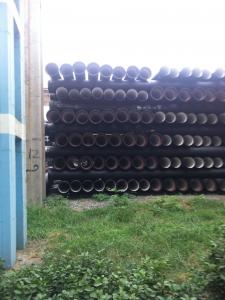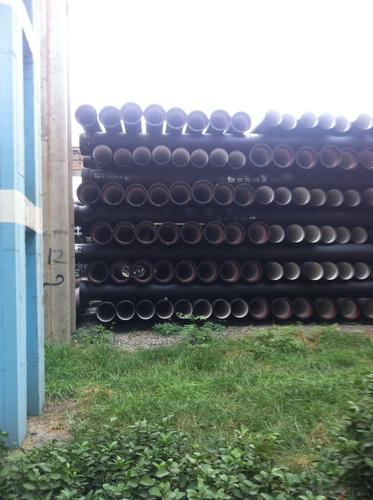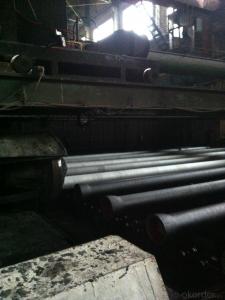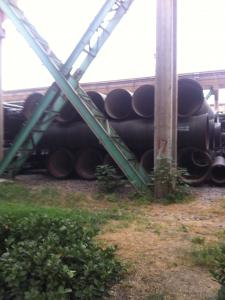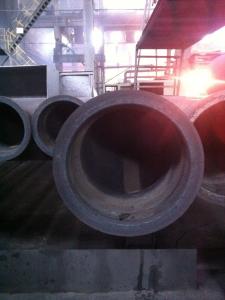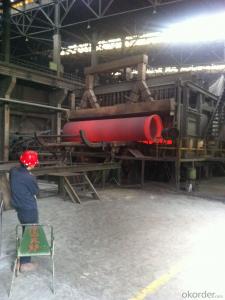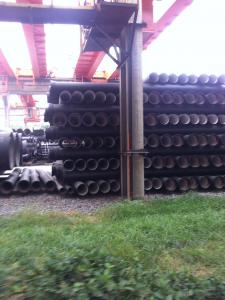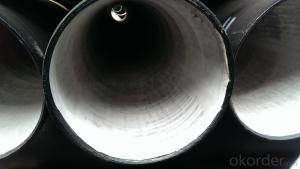DUCTILE IRON PIPES AND PIPE FITTINGS K9 CLASS DN300
- Loading Port:
- Tianjin
- Payment Terms:
- TT OR LC
- Min Order Qty:
- 22 pc
- Supply Capability:
- 3000 pc/month
OKorder Service Pledge
OKorder Financial Service
You Might Also Like
Material : Ductile Cast Iron
Size Range : DN 80mm to DN 2000mm
Unit Effective Length : 6m or 5.7m
Manufacture Standard: ISO 2531:1998/ EN 545:2006/EN 598:2007
Annual capacity : 200,000 tons
Coating Exterior: Zinc 130g/m2 according to ISO 8179-1 and bitumen coating 70 microns.
Cement Interior: Portland Cement/ High Alumina Cement/ Sulphate Resisting Cement Lining according to ISO 4179
Special requirements on external coating and internal lining can be applied
We also provide accessories such as SBR/EPDM rubber gaskets, lubricant paste, pipe caps, PE sleeves, etc.
Additional Parts:
Each pipe is strictly inspected according to related standard to ensure permanently high performance.
Easy Installation at site and service free for life
Long Service Lifespan
Quotation will arrive you within 24hours once we get your inquiry.
We guarantee offering you a competitive price.
A copy of original inspection reports of pipes will be offered after shipment.
Photos of loading process will be sent to the customer after shipment effect.
We will follow-up the delivery progress after shipment effect and update to the customer on weekly basis.
- Q: Can ductile iron pipe be used for hot water applications?
- Yes, ductile iron pipe can be used for hot water applications. Ductile iron pipe is known for its strength, durability, and high resistance to corrosion, which makes it suitable for a wide range of applications, including hot water systems. It can handle high temperatures and pressure, making it a reliable choice for transporting hot water. Additionally, ductile iron pipe's thermal conductivity properties allow for efficient heat transfer, ensuring that hot water is delivered effectively throughout the system. Therefore, when considering materials for hot water applications, ductile iron pipe is a suitable option.
- Q: Can ductile iron pipes be used for water main extensions?
- Water main extensions can utilize ductile iron pipes. These pipes are recognized for their robustness and longevity, making them a fitting option for extending water mains. They possess the capability of withstanding high pressure and resisting corrosion, essential for guaranteeing the durability and dependability of the water distribution system. Moreover, ductile iron pipes have a sleek interior surface, minimizing friction and enhancing the efficiency of water flow. In general, due to their favorable mechanical properties and capacity to withstand the demands of water distribution systems, ductile iron pipes are commonly employed in water infrastructure projects, including water main extensions.
- Q: Maximum pipe diameter of ductile iron pipe
- What I know is that the new ductile iron pipes can reach 2400MM, which can be checked by the official website
- Q: Are ductile iron pipes suitable for gravity sewer systems?
- Yes, ductile iron pipes are suitable for gravity sewer systems. Ductile iron pipes have high strength, durability, and flexibility, making them an excellent choice for underground sewer networks. They can withstand the pressure and weight of the soil above them, making them ideal for gravity flow systems where wastewater flows naturally due to gravity. Additionally, ductile iron pipes have a long lifespan and are resistant to corrosion, making them a reliable and cost-effective solution for gravity sewer systems.
- Q: Method for cutting cast iron pipe
- Depends on the material and the use of requirements. Ordinary gray iron, if the incision is not strict, such as water pipes. They are all sheared with hydraulic cutting machine, but the incision will not be very smooth. If it is ductile iron, and the incision requirements are high, it can only be used plasma cutting machine. General fittings, if not specifically required, shall not be cut by machining methods.
- Q: Are ductile iron pipes resistant to alkaline attacks?
- Generally, ductile iron pipes have resistance against alkaline attacks. Ductile iron is renowned for its durability and ability to resist corrosion, making it suitable for a range of applications, including water and wastewater systems. Certain metals can experience corrosion from alkaline substances, such as high pH levels in water or chemicals. However, ductile iron has been specially engineered to withstand these conditions. Its composition, which includes the addition of alloying elements like nickel and chromium, enhances its resistance to alkaline attacks. Moreover, ductile iron pipes are frequently coated with protective substances like cement mortar or polyethylene, which further increase their resistance against alkaline substances. Nevertheless, it is important to consider that the specific resistance of ductile iron pipes to alkaline attacks can be influenced by various factors, such as the concentration and duration of exposure to alkaline substances, as well as the presence of other corrosive agents. Therefore, it is always advisable to consult with manufacturers or industry experts to ensure the appropriateness of ductile iron pipes for specific alkaline environments.
- Q: What are the different joint types available for ductile iron pipe?
- The different joint types available for ductile iron pipe include push-on joints, mechanical joints, restrained joints, and flanged joints.
- Q: Are ductile iron pipes resistant to hydrogen sulfide corrosion?
- Yes, ductile iron pipes are generally resistant to hydrogen sulfide corrosion. Ductile iron is a type of cast iron that has been treated with magnesium to create a more flexible and durable material. This treatment significantly enhances its resistance to corrosion, including corrosion caused by hydrogen sulfide. The magnesium in the ductile iron forms a protective layer on the surface, preventing the penetration of hydrogen sulfide and other corrosive agents. However, it is important to note that the resistance of ductile iron pipes to hydrogen sulfide corrosion can still be influenced by factors such as the concentration and duration of exposure to the corrosive environment. Therefore, proper maintenance, regular inspection, and appropriate protective measures should still be implemented to ensure the long-term durability and performance of ductile iron pipes in the presence of hydrogen sulfide.
- Q: Can ductile iron pipes be used for cooling water systems?
- Yes, ductile iron pipes can be used for cooling water systems. Ductile iron pipes have excellent corrosion resistance and high-pressure capacity, making them suitable for conveying cooling water. Additionally, their strength and durability ensure long-term performance and stability in cooling water applications.
- Q: What are the different types of joints available for ductile iron pipe?
- Ductile iron pipes offer various types of joints, each with distinct advantages and suitability for different uses. Here are some of the most common joint options available: 1. Mechanical Joints: These joints create a watertight seal using a mechanical joint gland and rubber gasket. They are easy to install and allow for quick disassembly if needed. 2. Push-on Joints: This joint type involves compressing a rubber gasket when inserting the pipe into the fitting. It provides a reliable seal and requires no special tools for installation. 3. Restrained Joints: Designed to withstand higher internal pressures, restrained joints use a combination of mechanical or push-on joints along with additional restraints like thrust blocks or harnesses to prevent pipe separation. 4. Flanged Joints: Flanged joints connect two pipes using flanges and bolts. They are commonly used when frequent disassembly is required or when connecting to different types of pipes or equipment. 5. Welded Joints: In certain cases, ductile iron pipes can be welded together to create a strong and permanent connection. Welded joints are typically used in larger diameter pipes or specialized applications requiring high strength. When selecting the appropriate joint type for ductile iron pipes, it is essential to consider factors such as the pipe's application, pressure rating, and installation requirements.
Send your message to us
DUCTILE IRON PIPES AND PIPE FITTINGS K9 CLASS DN300
- Loading Port:
- Tianjin
- Payment Terms:
- TT OR LC
- Min Order Qty:
- 22 pc
- Supply Capability:
- 3000 pc/month
OKorder Service Pledge
OKorder Financial Service
Similar products
Hot products
Hot Searches
Related keywords
